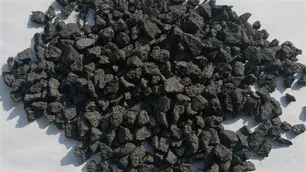Silicon carbide – metallurgical SiC
Metallurgical silicon carbide (70% Si, 30% C) is used in cast iron production in both electric furnaces and cupolas.
The use of silicon carbide in the production of synthetic cast iron instead of a combination of ferro-silicon and carbon results in a number of beneficial metallurgical effects. When foundry furnaces are loaded with large amounts of steel scrap, silicon carbide not only has a beneficial effect on the technology of the melting process, but also improves cast iron quality and reduces the risk of producing low-quality cast iron. These beneficial effects are due to the various specific properties unique to silicon carbide, which are applicable to both electric furnaces and cupolas.

The many factors involved in silicon and carbon transition to metal and deoxidation include:
- the fact that the silicon does not melt,
- the low specific gravity of silicon carbide,
- the resistance of silicon carbide to gas oxidation at high temperatures,
- the combination of silicon and carbon in the chemical compound SiC.
In addition to these four basic properties and benefits of using metallurgical silicon carbide in cast iron casting, there are its actions as a modifier and as a source of silicon and carbon, as well as its purity.
The microstructure of cast iron produced from silicon carbide shows a larger volume of graphite flakes than within the microstructure of cast iron produced from pig iron.
Delivery
We offer metallurgical silicon carbide in big bags of one tonne per big bag.
